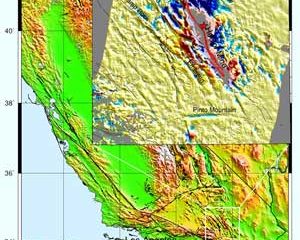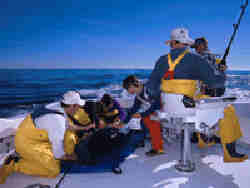Earth Sciences
Earth Sciences (also referred to as Geosciences), which deals with basic issues surrounding our planet, plays a vital role in the area of energy and raw materials supply.
Earth Sciences comprises subjects such as geology, geography, geological informatics, paleontology, mineralogy, petrography, crystallography, geophysics, geodesy, glaciology, cartography, photogrammetry, meteorology and seismology, early-warning systems, earthquake research and polar research.

Global warming may not have ended Ice-Age, says research
Scientists at the University of Sheffield have used fossilised leaves to determine the effect of greenhouse gases on the end of the Ice Age 300m years ago, according to an article published in PNAS.
The study, led by Professor David Beerling, examined fossilised leaves to determine how much carbon dioxide was in the air at various periods during the ice age.
Leaves have pores on their surface called stomata that act as “air holes” and open and close depending on the levels of carbo

Earthquake Study by Scripps Scientists Produces New Depiction of Fault Zones
Analysis uncovers unusual earthquake-related deformation, paves the way for methods to identify new active faults
On Oct. 16, 1999, approximately 37 miles from Palm Springs, Calif., a magnitude 7.1 earthquake ripped through 28 miles of faults in the Mojave Desert. Because of the area’s sparse population and development, the massive quake caused virtually no major measurable injuries or destruction.
Yet the “Hector Mine” event, named after a long-abandoned mine in the area, ha

Interpreting a climate record from 10,000-year-old migrating waters
Researchers confirm that waters migrating from the surface can take many tens of thousands of years to reach the water table
A team of researchers at Lawrence Livermore National Laboratory in California has confirmed that in drier regions, waters migrating from the surface can take many tens of thousands of years to reach the water table. Since such waters began their underground migration at the time of the last ice age, they hold a scientific and historical record of global climate

NASA scientists determined to unearth origin of the Iturralde Crater
NASA scientists will venture into an isolated part of the Bolivian Amazon to try and uncover the origin of a 5 mile (8 kilometer) diameter crater there known as the Iturralde Crater. Traveling to this inhospitable forest setting, the Iturralde Crater Expedition 2002 will seek to determine if the unusual circular crater was created by a meteor or comet.
Organized by Dr. Peter Wasilewski of NASA’s Goddard Space Flight Center, Greenbelt, Md., the Iturralde Crater Expedition 2002 will be l

Seabed Research Will Have Global Significance
Sediments in the Arabian Sea will be examined by an international scientific expedition led by a researcher from the University of Edinburgh to increase understanding of the natural processes of the ocean floor and establish its significance for global cycles and climate change. Robotic research platforms will be deployed on the sea floor to study deep-sea organisms and their impacts on sedimentary processes, without removing the creatures from their natural environment. Monsoons—winds that blow in o

Tagging the great white shark…and a few of his friends
What will some 4,000 of the smartest dressed elephant seals, tuna fish, albatrosses, leatherback sea turtles, great white sharks, and other pelagic megafauna in the Pacific all be wearing in the coming seasons? How about the latest in microprocessor-based electronic tags, some no bigger than oversized cufflinks? It’s all in a continuing effort to understand the habits of marine animals in that part of the world: what exactly lives where and why, what their migration routes and diving behaviors m